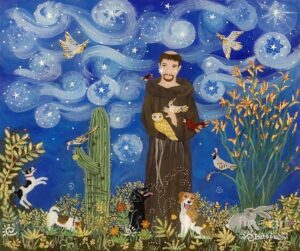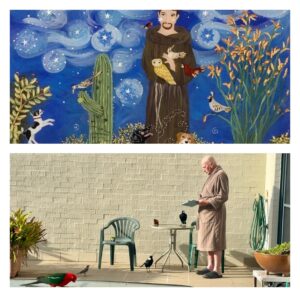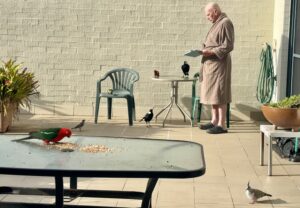Issue 40. 2024:2



Two Canticles
At a cottage by the sea I tackle Francis Webb, curious about
his poetry from Cap and Bells. Outside a wild spring ocean’s
curled waves tussle on the tide, comb to the edge, like spoonbills
probing every squint of sand and wrack. The horizon
is drawn-in, appropriate for this day in this ruptured world.
The sun finds thin spots to break through clouds, blades the sea
with thousands of stars and as quickly is blocked. In his poems
Francis tools words in obscurity and I must wait for the rare
glimmer to shine through, to touch their thousand stars before
they meld into his shadowed world. With torch and compass
I grope through the labours of Hospital Night and wait in the
dark for the sound of winged ones in the swaddled air of his
suite Ward Two. I once met a Benedictine nun who knew
Francis Webb, as an escapee from Parramatta Mental Hospital.
He knocked at her convent back door. Frail, lost, clutching
a book of poetry. Eyes eminently human, beaconed his ragged
struggle. His voice garbled: I am not seeking money or food
but peace. He scribbled out for her his poem Five Days Old.
Then a lonely, derelict figure slouched out the gate. His words
frisk the heroic-journey, explorers’ struggle, like one who holds
a shell, turns it over and over for light, shots of colour, as he
tackles the one-journey common to us all. His poems of
The Canticle echo another Francis who wrote Il Cantico,
who praised glimpses of brother sun and sister moon through
tender, frayed clouds, who walked barefoot, high-walled Assisi:
its olive groves, vineyards, lanes, paths of cobbled stone,
searching too for peace. Falling on his knees, face in his hands
he humbly made himself its instrument, finding the meaning
only in the search. He threw off worldly garb, gold and plumes
donned a court jester’s cap and bells, reverberating touch of
birdsong his bedrock. Through a darkling glass are two canticles
hundreds of years apart. Each Francis dances on fear’s altar. Both
be fools, taunted, for gnawing life to the bone. Both seeing beauty
in the tiny not the immense. Outside, flocks of sea gulls skim
the southerly, skate on the edge. I listen to their skirl on the air,
wayfarers, like the ocean in its unceasing quest.
Colleen Keating
Winner of the Phillipa Holland Poetry 2024 with Eastwood/Hills FAW (Fellowship of Australian Writers)
———————————–
Colleen Keating is a Sydney poet. Her writing explores the wonder and paradox of nature with the harsh realities of life, justice, equality and the increasing threat to our natural environment. Her poem, Fifth Symphony was recently awarded Highly commended in the Poetic Christi Press poetry competition and published in the new Anthology A New Day Dawns 2024. Colleen has published six collections of poetry, including two award-winning verse novels, Hildegard of Bingen: A poetic journey and Olive Muriel Pink: her radical & idealistic life. Her newly published book is The Dinner Party: A poetic reflection. (2023) All are available through Ginninderra Press. Colleen writes on Ku-ring-gai land in Sydney and Darkinjung on the Central Coast NSW.
Also welcomed to be published by Michael Griffith.author of Cap and Bells
Hello Colleen, I love this poem! It captures so much of the essence of Francis Webb’s passion and the direction of his own search. In terms of our current poetry sessions – Poetry’s Job- I feel this is a perfect poem for illustrating how poetry here (your poetry and the poetry of the poet you celebrate) give voice to the quest for wholeness in a difficult, tumultous world. Your own beautiful observations of nature carry me back to what we were saying just yesterday about Jane Hirschfield’s recognition that the real source of nourishment for her own search is the immediate:
Can admire with two eyes the mountain
actual, recalcitrant, shuffling its pebbles, sheltering foxes and beetles.
—
Can make black-eyed peas and collards.
Can make, from last year’s late-ripening persimmons, a pudding.
Thank you Colleen!
* * * * * * * * * * * * * *
‘Brilliant’ Colleen! Your writing demonstrates the ache and artistry of Scott Fitzgerald
with your ability to tie the lives of two people together over that vast distance of time.
I am sure Michael Leunig would have gathered inspiration for one of his works
from your ‘Two Canticles’ if he was still with us.
Your writing is much deserving of a broader audience.
Congratulations!
Michael Linich (Dr. Michael Linich Lecturer, Science Education at University of Newcastle NSW. Australia.
